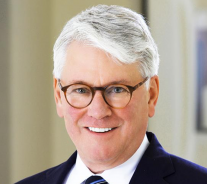Greg Craig Wasn't Guilty. The American Lobbying Industry On The Other Hand....
Why are anti-corruption laws something so easily sidestepped?

Greg Craig
Put aside that Greg Craig’s whole prosecution felt a bit off. The SDNY took a pass on the case before the DOJ picked it up — seemingly just to make sure someone attached to the Obama administration managed to get tagged in the Russian profiteering kerfuffle. Regardless, Craig is a free man after the jury took all of four hours to acquit him of lying to the government about whether or not he acted as a foreign agent of the government of Ukraine when he wrote a report at the behest of the country’s then-pro-Russian government whitewashing the arrest of opposition party leaders.
According to a couple of jurors, Craig’s vindication may have had more to do with technicalities.

Is The Future Of Law Distributed? Lessons From The Tech Adoption Curve
Because of the statute of limitations applicable in the case, the judge told jurors that they could only find Craig guilty if prosecutors showed beyond a reasonable doubt that Craig concealed a material fact about his Ukraine work after Oct. 3, 2013. At least some jurors believed Craig had lied before that date, but they found a lack of proof he did so after that point, the two jurors said.
Skadden and Craig were trying not to become “foreign agents” of the Ukrainian government, something that would require them to register as such per America’s lobbying laws. Basic agency theory would say that someone hired to write a report for another country is, indeed, an agent of that country and writing a report for the purpose of convincing government officials not to sanction that country would seem like lobbying. But that’s not how America’s anti-corruption rules work because that would make far too much sense. For Craig, the firm could avoid registering if they never put forward the report themselves for public relations purposes. It’s not “lobbying” if you give the lobbying material to someone else… even if that person is then going to use your name and reputation as the selling point for the argument.
Craig gave his work product to a reporter, but claims — at least as of the relevant date — he only did so when affirmatively asked for it meaning he wasn’t promoting the work and therefore not a foreign agent lobbying the government. Weak tea to be sure, but good enough.
Craig’s story though is indicative of a much more pervasive problem. There are firms with departments explicitly described as “Lobbying” shops that get very snippy if you call the people at the top of their promotional materials “lobbyists.” One law firm representative once scolded me for calling an employee a lobbyist, explaining that I could describe their job as lobbying as long as I never used the word “lobbying.” Orwell imagined that doublespeak would conceal big lies — in reality it conceals billions of dollars of small lies.
Sponsored

The Business Case For AI At Your Law Firm


Navigating Financial Success by Avoiding Common Pitfalls and Maximizing Firm Performance

Early Adopters Of Legal AI Gaining Competitive Edge In Marketplace

The Business Case For AI At Your Law Firm

Washington operates on posting firm rules regulating the seedy world of lobbying and then everyone just consents to this collective delusion that lobbying isn’t lobbying if we don’t call it that. It’s the only way a former official can really make a living! An academic once estimated that the lobbying industry is at least double what we see based on official registrations.
I don’t know if Greg Craig and Skadden were ever foreign agents for Ukraine. The jury only decided that Craig never did anything after October 3, 2013 to suggest that he was and that’s the only “crime” he could have arguably committed. But even if we don’t have a solution readily at hand for the broader problem of unregistered lobbying, can this country at least come to the conclusion that we can use the word “lobbying” to describe “former government officials doing stuff on behalf of others to persuade current officials”? Can we say “small-L lobbying” or something? The first step to fixing anything is agreeing on how to describe the problem.
Greg Craig found not guilty in Ukraine lobbying case [Politico]
 Joe Patrice is a senior editor at Above the Law and co-host of Thinking Like A Lawyer. Feel free to email any tips, questions, or comments. Follow him on Twitter if you’re interested in law, politics, and a healthy dose of college sports news. Joe also serves as a Managing Director at RPN Executive Search.
Joe Patrice is a senior editor at Above the Law and co-host of Thinking Like A Lawyer. Feel free to email any tips, questions, or comments. Follow him on Twitter if you’re interested in law, politics, and a healthy dose of college sports news. Joe also serves as a Managing Director at RPN Executive Search.
Sponsored

Is The Future Of Law Distributed? Lessons From The Tech Adoption Curve








